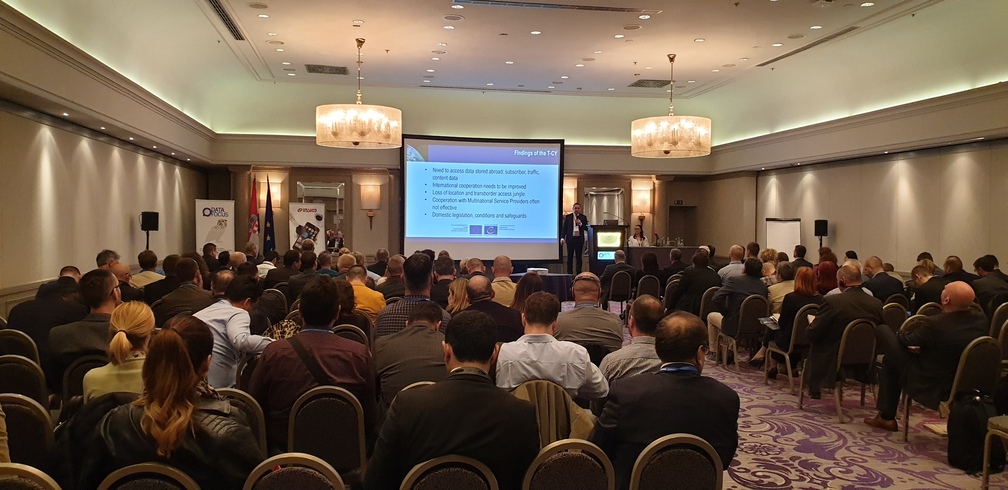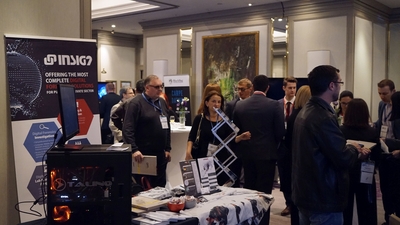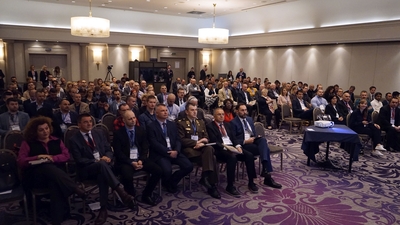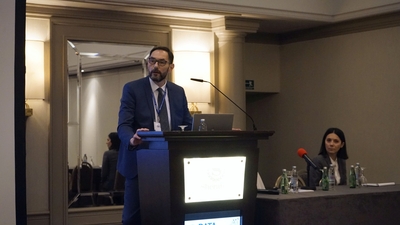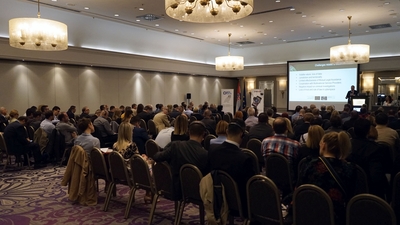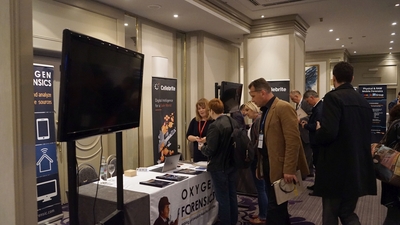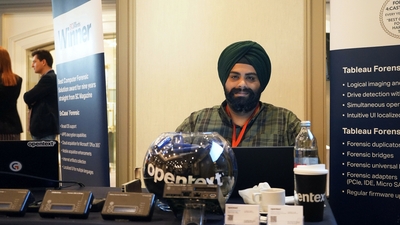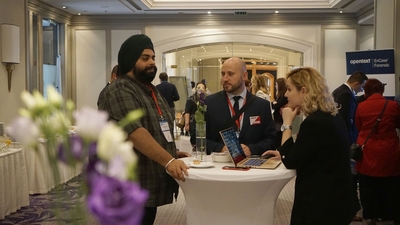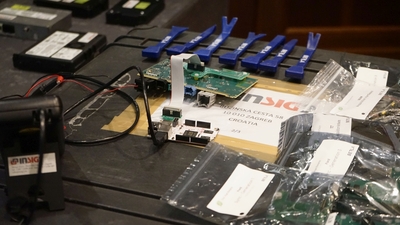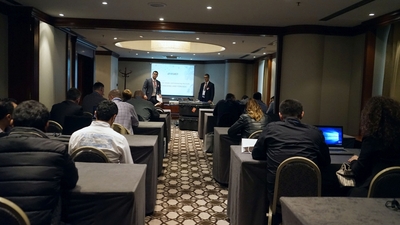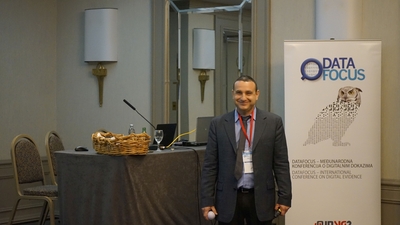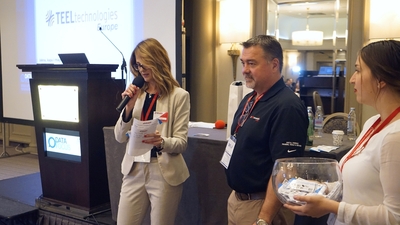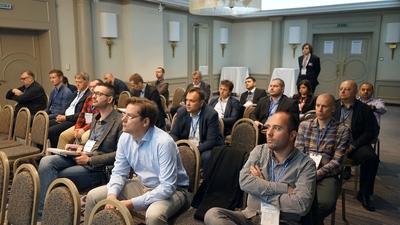
DataFocus 2019
30th of April | Sheraton hotel Zagreb, Zagreb, Hrvatska
DataFocus is all about exchanging experiences
We bring together law enforcement investigators, prosecutors, judges, court expert witnesses, and other experts, and let them talk about their experiences with digital evidence and digital forensic investigations.
Since 2012
Every year
Entrance
DataFocus
DataFocus conference is divided into several sections
Explore distinct sections offering insights into technical facets of evidence handling, showcase the latest products and services, and participate in interactive workshops.
Investigation section
Lecturers address technical aspects of finding, preserving, and processing digital evidence and the legal presentation of digital evidence in criminal and administrative proceedings.
Technical section
Experts provide lectures showcasing and demonstrating the latest products, services, and trends in the digital forensic field.
Workshops
At the event, our partners will conduct a series of workshops, providing participants with opportunities for personalized inquiries and live demonstrations.
Agenda
Agenda
8:30-9:00
REGISTRATION, WELCOME COFFEE
9:00 – 9:30
Opening ceremony (Grand Hall - Section B) Goran Oparnica, Managing Director, INsig2, Croatia Dražen Jelenić, The Attorney General Republic of Croatia, Croatia Davor Božinović, Ph. D., Minister, Ministry of Internal Affairs, Croatia
Daniela Trbović
Ceremony host9:30-10:15
Keynote presentations (Grand Hall - Section B) - New instruments for cross-border cooperation in accessing e-evidence: are we hitting rock bottom?
Ph.D. Tatiana Tropina
Senior Researcher, Max Planck Institute for Foreign and International Criminal Law Freiburg, Germany9:30-10:15
Keynote presentations (Grand Hall - Section B) - New instruments for cross-border cooperation in accessing e-evidence: are we hitting rock bottom?
On both sides of the Atlantic, last year was marked by the development of legislative tools on transborder access to e-evidence, widely criticized by privacy advocates, national governments, and academics. The US Cloud Act, enacted in 2018, and the EU E-Evidence proposal, put forward in April of the same year, started processes that have been characterized as an arms race to dismantle existing safeguards to access data and content in global information networks. Both instruments try to re-design the existing regime of mutual legal assistance by providing the tools for requesting data directly from communications providers without judicial authorization in the country where the request is sent. In fact, the new instruments turn private entities into de-facto judicial authorities: it imposes the obligation to provide data upon legal requests coming from foreign law enforcement with no verification of such demands against privacy safeguards on the national level. The frustration felt by legislators and law enforcement is understandable. Mutual legal assistance is slow because it requires due process and safeguards. However, are the shortcuts proposed by the Cloud Act and the EU E-Evidence draft directive helpful? What are the dangers of the approach they propose, and what should be done instead to improve fighting crime online while safeguarding the privacy of users and following due process? The presentation will provide insights into the content of these new legislative proposals, discuss their shortcoming, and propose the way forward to improve trans-border cooperation in accessing electronic evidence.
Lecturer:
Tatiana Tropina
Senior Researcher, Max Planck Institute for Foreign and International Criminal Law Freiburg, Germany
10:15-11:00
Keynote presentations (Grand Hall - Section B) - Access to electronic evidence: Way forward to the Second Additional Protocol to the Budapest Convention
Markko Künnapu
Member of the Cybercrime Convention Committee (T-CY), Council of Europe, Estonia10:15-11:00
Keynote presentations (Grand Hall - Section B) - Access to electronic evidence: Way forward to the Second Additional Protocol to the Budapest Convention
The purpose of the lecture and the presentation is to provide a brief overview of the problems that practitioners have been facing concerning timely access to electronic evidence stored abroad. The Budapest Convention as the only legally binding international instrument on cybercrime and electronic evidence already provides some solutions, but these are not sufficient considering the latest developments of the ICT. The Cybercrime Convention Committee has started work in order to find solutions already several years ago. In 2017 negotiations of the Second Additional Protocol to the Budapest Convention started. The Protocol would provide answers and solutions to the problems that have been identified. However, drafting such a new instrument is not an easy task and requires also cooperation with all the stakeholders.
Lecturer:
Markko Künnapu
Member of the Cybercrime Convention Committee (T-CY), Council of Europe, Estonia
11:00-11:30
Coffee break
11:30-12:00
Social media & digital evidence The Spanish approach
Patricia Ayodeji
Founding Lawyer, E-PDP PROTECCIÓN DE DATOS PERSONALES, Spain12:05-13:10
Hackers in law: The shotgun marriage of malware and criminal justice
Steven David Brown
Crime, Justice, and Law Enforcement Specialist, Austria13:15-14:30
Lunch - Restaurant Tomislav
14:30-15:00
Use of digital evidence in criminal cases
Darinka Brđanović
Deputy County State Attorney in Varaždin, Croatia15:05-16:10
Electronic evidence and human rights protection
Kornelija Ivanušić
Judge, Municipal Court in Velika Gorica, CroatiaBojana Paunović
Judge, Court of Appeal in Belgrade, SerbiaVladimir Milošeski
State Attorney, Municipal State Attorney's Office in Skopje, North Macedonia16:15-16:45
Application of the General Data Protection Regulation - GDPR in court decisions
Vitomir Boić
Judge, County Court of Velika Gorica, Croatia17:00-17:15
Closing ceremony - Tombola, Final words of the organizer
9:00-9:30
Opening ceremony (Grand Hall - Section B) Goran Oparnica, Managing Director, INsig2, Croatia Dražen Jelenić, The Attorney General Republic of Croatia, Croatia Davor Božinović, Ph. D., Minister, Ministry of Internal Affairs, Croatia
Daniela Trbović
Ceremony host9:30-10:15
Keynote presentations (Grand Hall - Section B) New instruments for cross-border cooperation in accessing e-evidence: are we hitting rock bottom?
Ph.D. Tatiana Tropina
Senior Researcher, Max Planck Institute for Foreign and International Criminal Law Freiburg, Germany9:30-10:15
Keynote presentations (Grand Hall - Section B) New instruments for cross-border cooperation in accessing e-evidence: are we hitting rock bottom?
On both sides of the Atlantic, last year was marked by the development of legislative tools on transborder access to e-evidence, widely criticized by privacy advocates, national governments, and academics. The US Cloud Act, enacted in 2018, and the EU E-Evidence proposal, put forward in April of the same year, started processes that have been characterized as an arms race to dismantle existing safeguards to access data and content in global information networks. Both instruments try to re-design the existing regime of mutual legal assistance by providing the tools for requesting data directly from communications providers without judicial authorization in the country where the request is sent. In fact, the new instruments turn private entities into de-facto judicial authorities: it imposes the obligation to provide data upon legal requests coming from foreign law enforcement with no verification of such demands against privacy safeguards on the national level. The frustration felt by legislators and law enforcement is understandable. Mutual legal assistance is slow because it requires due process and safeguards. However, are the shortcuts proposed by the Cloud Act and the EU E-Evidence draft directive helpful? What are the dangers of the approach they propose, and what should be done instead to improve fighting crime online while safeguarding the privacy of users and following due process? The presentation will provide insights into the content of these new legislative proposals, discuss their shortcoming, and propose the way forward to improve trans-border cooperation in accessing electronic evidence.
Lecturer:
Tatiana Tropina
Senior Researcher, Max Planck Institute for Foreign and International Criminal Law Freiburg, Germany
10:15-11:00
Access to electronic evidence: Way forward to the Second Additional Protocol to the Budapest Convention
Markko Künnapu
Member of the Cybercrime Convention Committee (T-CY), Council of Europe, Estonia10:15-11:00
Access to electronic evidence: Way forward to the Second Additional Protocol to the Budapest Convention
The purpose of the lecture and the presentation is to provide a brief overview of the problems that practitioners have been facing concerning timely access to electronic evidence stored abroad. The Budapest Convention as the only legally binding international instrument on cybercrime and electronic evidence already provides some solutions, but these are not sufficient considering the latest developments of the ICT. The Cybercrime Convention Committee has started work in order to find solutions already several years ago. In 2017 negotiations of the Second Additional Protocol to the Budapest Convention started. The Protocol would provide answers and solutions to the problems that have been identified. However, drafting such a new instrument is not an easy task and requires also cooperation with all the stakeholders.
Lecturer:
Markko Künnapu
Member of the Cybercrime Convention Committee (T-CY), Council of Europe, Estonia
11:30-12:00
Financial crime and what we can learn from banks
Lucia Ana Tomić, Direktor
Hrvatska poštanska banka, Croatia12:05-12:35
Advanced Hardware Acquisition Techniques - Don't give up on them yet!
Bob Elder
CEO-Partner, Teel Technologies, Kanada12:40-13:10
Illicit Tobacco Sales on the Internet
Chris Mckenzie
Operations Manager, Anti Illicit Trade, United Kingdom14:30-15:00
Database analysis for identifying criminal offenses perpetrators – a case study
Dražen Škrtić
Police Consultant, Ministry of Interior, Croatia15:05-15:35
How not to get lost in the data jungle?
Rūta Jašinskienė
Consultant, NRD CS, Lithuania15:40-16:10
Cyber incidents forensic analysis
Damir Paladin
Director, Borea, Croatia16:15-16:45
Fiscal cash registers database forensics
Ante Markić
Court Expert, Croatia11:30-12:00
So What’s happening with EnCase & Tableau?
Stephen Gregory
Principal Forensic Solutions Consultant, OpenText, Canada12:05 – 12:35
Fast Video and Image Carving with Lace Forensic Carver
Antoine Normand
CEO, Bluebear, Canada12:40-13:10
AD Quin-C - the next step for Digital Forensics
Artem Kruzhilin
Country Manager, AccessData, USA14:30-15:00
Physical Decrypted Images from Macs with the T2 Chip'
Tim Thorne
Forensic Analyst and Instructor, BlackBag Technologies, USA15:05-15:35
WhatsApp Forensics. Advanced methods of extraction and decryption
Tanya Pankova
Marketing Director, Oxygen Forensics, USA15:40-16:10
Magnet Forensics Product Overview and AXIOM 3.0 Highlights
Carl Tinker
Sales Director, Magnet Forensics, CanadaPatrick Griffith
Regional Account Manager, Magnet Forensics, Canada16:15-16:45
The Power of Digital Data Analytics
Ariel Karayev
Sales Engineer, Cellebrite, Israel11:30-13:10
BlackLight for Windows Analysis
Tim Thorne
Forensic Analyst and Instructor, BlackBag Technologies, USA14:30-16:45
Car Forensics
Saša Deković
INsig2, Consultant, CroatiaPlenary lecturers
Tatiana Tropina
Senior Researcher, Max Planck Institute for Foreign and International Criminal Law Freiburg, Germany
Biography
Tatiana Tropina is a senior researcher at the Max Planck Institute for Foreign and International Criminal Law in the Information Law and Legal Informatics Section. Her current areas of research include international standards to fight cybercrime, the comparative analysis of cybercrime legislation, self- and co-regulation, public-private partnerships to address cybersecurity issues, and the multi-stakeholder approach to fight cybercrime. Tatiana Tropina’s background includes both academic and practical experience. She has been conducting cybercrime research for more than 12 years, starting in Russia in 2002, where she became the first Russian researcher to defend a PhD thesis on cybercrime (2005). From 2002 to 2009, she was responsible for cybercrime projects at the regional subdivision of the Transnational Crime and Corruption Centre (George Mason University, USA) in Vladivostok, Russia. At the same time, from 2003 to 2008, she worked full-time as a lawyer and then as head of the legal departments of a number of telecommunication companies. In 2008, she won the British Chevening Scholarship to study telecommunications management at Strathclyde University, Glasgow. In 2009, she was awarded a German Chancellor Fellowship (Alexander von Humboldt Foundation) and moved to Germany to pursue her research on legal frameworks for cybercrime. Since 2009, Tatiana Tropina has been involved in both legal research and various applied cybercrime projects at the international level. This activity includes such projects as drafting model legislation on the interception of communication for the Caribbean states and adapting it via stakeholder consultations (ITU-EU project, 2010) and carrying out a cybercrime study for the Global Symposium of Regulators (ITU, 2010). Recently, she served as a consultant to the UNODC Comprehensive Cybercrime Study (2012-2013) and to the World Bank (World Development Report 2016). Tatiana Tropina has a number of publications to her credit, including a monograph on cybercrime. She is frequently invited to present on her research at various international events.
Lecture:
New instruments for cross-border cooperation in accessing e-evidence: are we hitting rock bottom?
Markko Künnapu
Member of the Cybercrime Convention Committee (T-CY), Council of Europe, Estonia
Biography
Markko KÜNNAPU is currently a member of the Bureau of the Convention Committee on Cybercrime (T-CY), which supervises the implementation and dealing with other matters related to the Convention on Cybercrime. Between 2010-2014 he was the Chair of the Committee. He graduated from the Law Faculty of Tartu University in 2001 and after that worked in the Tallinn Police Prefecture and in the Legal Department of the Ministry of Interior Since 2005 he has been working in the Criminal Policy Department of the Ministry of Justice of Estonia. He has been involved in drafting several legislative proposals, including legislation concerning cybersecurity, cybercrime, identity theft, and other aspects of criminal law and procedure. As a government representative, he has participated in different working and expert groups as well as committees of the European Union, the Council of Europe, and the United Nations. Since 2014 he has been an associated expert on cybercrime and cybersecurity at the e-Governance Academy in Tallinn, Estonia. He has been also a trainer and speaker at different national and international workshops, seminars, and conferences.
Lecture:
Access to electronic evidence: Way forward to the Second Additional Protocol to the Budapest Convention
All lecturers
Ante Markić
Antoine Normand
Ariel Karayev
Bob Elder
Carl Tinker
Damir Paladin
Darinka Brđanović
Dražen Škrtić
Lucia Ana Tomić
Patricia Ayodeji
Patrick Griffith
Rūta Jašinskienė
Stephen Gregory
Steven David Brown
Tatiana Pankova
Vitomir Boić

Sheraton hotel Zagreb
Street kneza Borne 2, 10000, Zagreb, Croatia
DataFocus Archive
DataFocus is an international conference on digital evidence that we have been successfully organizing since 2012.
see all